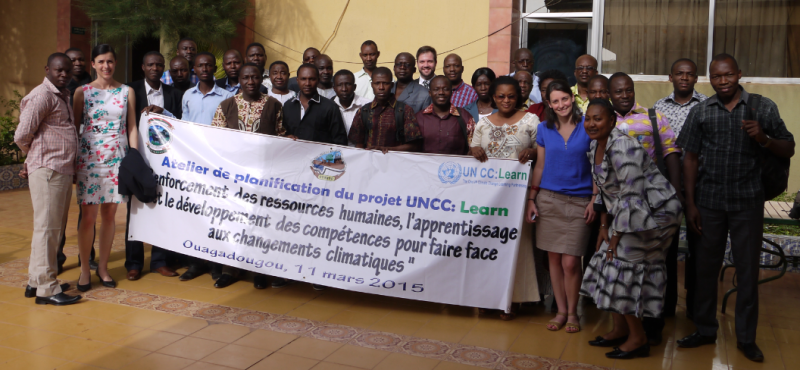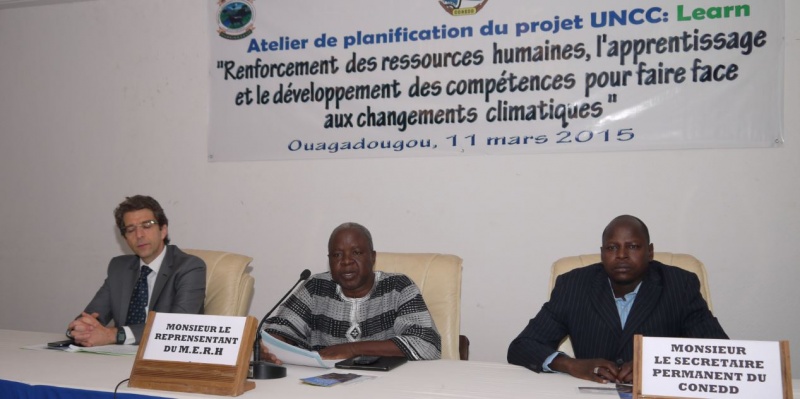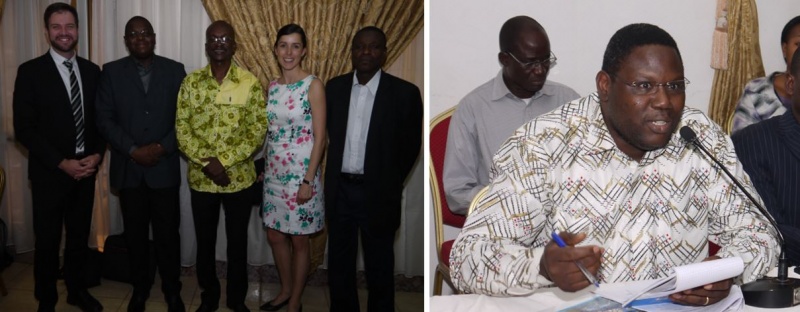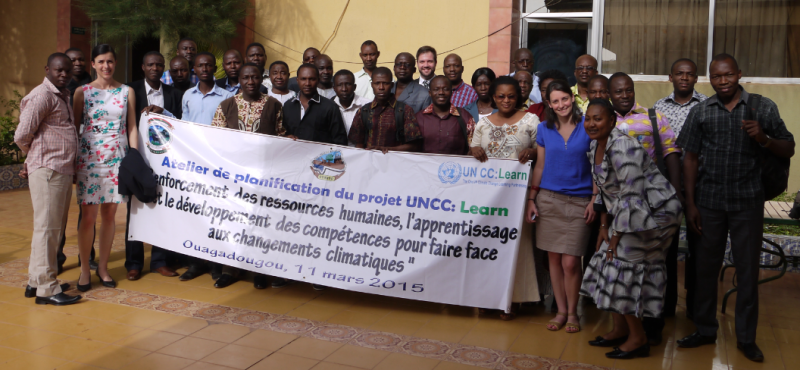(Voir l’article en français plus bas)
Burkina Faso has started the process of systematically strengthening learning and skills development related to climate change: close to 50 people from the government sector, as well as civil society, training institutions and development partners took part in the National Planning Workshop for the Development of Burkina Faso’s National Climate Change Learning Strategy. The event, which took place at the Palm Beach Hotel in Ouagadougou on 11 March 2015, was an occasion to ensure all national partners were on board, agree on a number of priority sectors, as well as to validate the background report and work plan for the development of the strategy. The event was organized by the Secrétariat Permanent du Conseil national pour l’environnement et le développement durable (SP-CONEDD) of Burkina Faso with support from UN CC:Learn and financing from the Swiss Development Corporation. Representatives from neighbouring countries, Benin and Niger, also attended.

High-Level Support
“The issue of skills development is fundamental to attain the national objectives in terms of climate change”, said Mr. Marc Rubin, head of UNICEF in Burkina Faso in the opening session. Mr. Salomon Dilema, Technical Advisor of the Minister of Environment of Burkina, added that even though “the National Adaption Plan of Action (NAPA) reports show that Burkina Faso can count on over 500,000 people that are aware of climate change issues […], current training and awareness-raising activities remain insufficient when one looks at the actual and projected impacts of climate change in our country”. As such, the development of a National Climate Change Learning Strategy is a way to rise up to the challenge of scaling-up skills development in the country.

M. Marc Rubin, head of UNICEF in Burkina Faso, M. Salomon Dilema, Technical Advisor to the Minister of Environment of Burkina, and Pamoussa Ouedraogo, Technical Coordinator of Programmes at SP-CONEDD
A First Step Towards a National Climate Change Learning Strategy
Mr. Joël Korahire, National Coordinator of the UN CC:Learn project in Burkina, presented the proposed work plan for the development of the National Climate Change Learning Strategy in Burkina, which was validated by the participants. Participants also endorsed the background report, the priority sectors and the vision for the Strategy. The next step will be to organize the learning needs and capacity assessments which will support the definition of priority learning activities.
Regional Cooperation
The workshop provided an opportunity for Mr. Léonce Glèlè Ahanhanzo, Climate Change Learning Ambassador from Benin, to share his experience with developing and implementing a National Climate Change Learning Strategy in Benin. A representative from Niger, Mr. Gousmane Moussa, climate change advisor at the Secrétariat Exécutif du Conseil national de l’environnement pour un développement durable (SE-CNEDD) of Niger, was also present in order to find inspiration for the launch of the project in his country, which is expected to happen in May 2015.
In his closing remarks, Dr. Moumini Savadogo, head of the country programme for UICN and moderator of the workshop, highlighted opportunities for regional collaboration between Benin, Burkina Faso and Niger in the area of climate change training and education.

Left : M. Vincens Côté, UN CC:Learn Secretariat; M. Léonce Glèlè Ahanhanzo, Climate Change Learning Ambassador from Bénin; M. Joël Korahire, National Coordinator of the UN CC:Learn project in Burkina Faso; Ms. Amrei Horstbrink, UN CC:Learn Secretariat; M.
Support from the UN System
One the day following the National Planning Workshop, the UN Resident Coordinator convened the UN system in the country for a meeting with the national coordinator of the project and the UN CC:Learn Secretariat in order to discuss synergies between the Climate Change Learning Strategy and the various programmes present in Burkina Faso. The meeting was attended by heads and representatives of the UN Food and Agriculture Organization (FAO), the UN Office for the Coordination of Humanitarian Affairs (OCHA), the Joint UN Programme on HIV/AIDS (UNAIDS), the UN Development Programme (UNDP), the UN Children Fund (UNICEF), the UN Industrial Development Organization (UNIDO), the World Food Programme (WFP) and the World Health Organization (WHO). UN partners congratulated the Government of Burkina for their leadership in strengthening climate change learning in the country and expressed their support for the development and implementation of the National Strategy.
The event was featured on the national television, coverage can be found here (starting at minute 4:45).
Français
11 mars 2015, Ouagadougou, Burkina Faso. Le Burkina Faso a entamé son processus pour le renforcement systématique des compétences en lien avec les changements climatiques : près de 50 personnes issues de divers ministères, de la société civile, des institutions de formation et les partenaires du développement ont pris part à l’Atelier national de planification pour le développement de la Stratégie nationale d’apprentissage sur les changements climatiques du Burkina Faso. L’événement, qui a eu lieu à l’hôtel Palm Beach de Ouagadougou, le 11 mars 2015, a permis d’assurer que tous les partenaires nationaux participent au processus, ainsi que de valider le rapport de base, les orientations stratégiques et le plan de travail de la stratégie. L’atelier a été organisé par le Secrétariat Permanent du Conseil National pour l’Environnement et le Développement durable (SP-CONEDD) du Burkina Faso, avec l’appui de UN CC:Learn et le soutien financier de la Corporation de développement suisse. Des représentants du Bénin et du Niger étaient aussi présents.
Soutien de haut niveau
« La notion de compétences et de développement des ressources humaines est capitale pour l’atteinte des objectifs nationaux en termes de changements climatiques », a commenté M. Marc Rubin, représentant de l’UNICEF au Burkina Faso, lors de l’ouverture de l’atelier. M. Salomon Dilema, Conseiller technique du Ministre de l’environnement et des ressources halieutiques du Burkina Faso, a ajouté que bien que « l’évaluation des projets du PANA montre que le Burkina Faso compte en son actif plus de 500 000 personnes sensibilisées sur les changements climatiques à travers les médias, les théâtres-fora et d’autres rencontres tenues à cet effet […], les mesures prises en lien avec l’éducation, la formation et la sensibilisation malgré leurs résultats probants restent assez insuffisantes au regard des impacts vécus et attendus des changements climatiques dans le contexte de notre pays ». Ainsi, le développement d’un Stratégie nationale d’apprentissage sur les changements climatiques est une manière de faire face au défi du renforcement systématique des compétences dans le pays.
Un premier pas vers un Stratégie nationale d’apprentissage sur les changements climatiques
M. Joël Korahire, coordonnateur du projet UN CC:Learn au Burkina, a présenté le plan de travail proposé pour le développement de la stratégie au pays, et celui-ci a été validé par les participants. Il a aussi été question du rapport de base, des secteurs prioritaires et de la vision pour la stratégie. La prochaine étape sera d’organiser les évaluations des besoins et des capactiés en termes d’apprentissage sur les changements climatiques, qui aideront à définir des actions prioritaires à mettre en œuvre.
Coopération régionale
L’atelier a été une opportunité pour Léonce Glèlè Ahanhanzo, Ambassadeur pour l’apprentissage sur les changements climatiques du Bénin, de partager sur le terrain son expérience avec les nouveaux pays UN CC:Learn. Les participants ont apprécié la possibilité d’en connaître davantage au sujet de l’expérience du Bénin en termes d’opportunités et de défis liés avec le développement et la mise en œuvre d’une stratégie nationale d’apprentissage sur les changements climatiques. Un représentant du Niger, M. Gousmane Moussa, conseiller en changements climatiques au Secrétariat Exécutif du Conseil National de l’Environnement pour un Développement Durable (SE-CNEDD) du Niger, était aussi présent afin de tirer inspiration de cette activité pour le lancement du projet dans son pays qui devrait avoir lieu en mai.
Lors de la clôture de l’événement, le Dr. Moumini Savadogo, le Directeur pays du projet national de l’IUCN et modérateur de l’atelier, a souligné l’opportunité d’une collaboration régionale entre le Bénin, le Burkina Faso et le Niger au sujet de l’éducation et de la formation sur les changements climatiques.
Soutien du système des Nations Unies
Le lendemain de l’atelier, le Coordonnateur Résident des Nations Unies au Burkina Faso a invité le système des Nations Unies du pays à une rencontre avec le coordonnateur national du projet et le Secrétariat de UN CC:Learn afin de discuter de synergies possibles entre les différents projets et programmes présents. Des représentants de haut niveau de l‘Organisation des Nations Unies pour l’alimentation et l’agriculture (FAO), le Bureau des Nations Unies pour la coordination des affaires humanitaires (OCHA), le Programme commun des Nations Unies sur le SIDA (ONUSIDA), le Programme des Nations Unies pour le développement (PNUD), le Fonds des Nations Unies pour l’enfance (UNICEF), l’Organisation des Nations Unies pour le développement industriel (ONUDI), le Programme alimentaire mondial (PAM), et l’Organisation mondiale de la santé (OMS) étaient présents. Les partenaires de l’ONU ont félicité le gouvernement du Burkina pour leur leadership au sujet du renforcement de l’apprentissage sur les changements climatiques dans le pays et ont offert leur soutien pour le développement et la mise en œuvre de la Stratégie nationale.
L’événement a été couvert par les médias nationaux, un reportage télévisé peut être trouvé ici (début à la minute 4:45).

